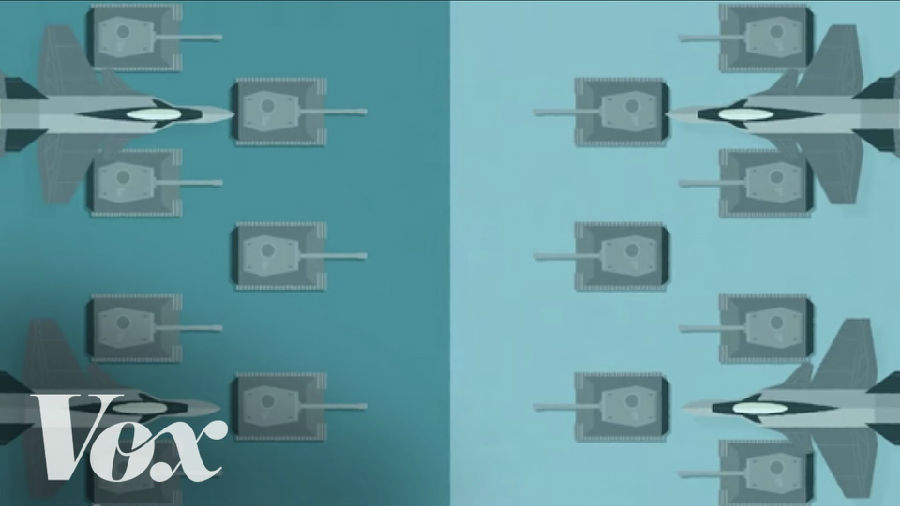(单词翻译:单击)
So if you read the headlines, it kind of seems like the world is a terrible place, full of violence, despair, and war.
阅读头条新闻,你会觉得这个世界是一个可怕的地方,充满了暴力,绝望和战争。
But it turns out war is actually declining.
但事实证明,战争实际上是在减少的。
We live in the most peaceful time in human history.
我们正生活在人类历史上最平静的时期。
There's lots of reasons why, but here are three of the biggest ones.
这背后有很多原因,最主要的有三个。
First, the spread of democracy around the world.
首先是民主在世界各地的传播。
International relations scholars have found consistently that democracies don't fight wars with each other.
国际关系学者一致认为,民主国家不会相互打仗。
Now why is that true?
那为什么会这样呢?
There might be plenty of reasons but one big one is that people who live in democracies think it's wrong to start wars with other democracies.
可能有很多原因,但其中一个重要原因是生活在民主国家的人认为与其他民主国家开战是错误的。
They're legitimate governments -- it's wrong to attack them.
他们是合法的政府 - 攻击他们是错误的。
But there's a flipside to this.
然而,这只是一方面。
Democracies do often fight wars with autocracies.
另一方面,民主国家经常与专制国家打仗。
Luckily, most of the world's countries are democracies now, so the democratic peace is probably making the world a much more peaceful place.
幸运的是,世界上大多数国家现在都是民主国家,所以民主和平可能会让世界变得更加和平。
Second big reason why war is declining is nuclear deterrence.
核威慑是战争衰落的第二大原因。
Nuclear weapons, obviously big and scary.
核武器显然是大而可怕的。
However, nuclear deterrence may have prevented a devastating war between the United States and the Soviet Union.
但是,核威慑可能阻止了美国和苏联之间的毁灭性战争。 
Everyone recognized that they would lose.
每个人都觉得他们会输。
Statistical evidence suggests that that is true -- that most countries are too scared of the consequences of nuclear war to fight one.
统计证据表明,情况确实如此 - 大多数国家都对核战争造成的后果感到恐惧。
There's a dark side, and not just the risk of global annihilation from an accident.
然而,这里面也有一个弊端,而且不仅仅是事故造成全球湮灭的风险。
If a country gets nuclear weapons, they feel rather safer in being aggressive in little ways, you know, small conflicts or bullying around their non-nuclear neighbors.
如果一个国家有了核武器,他们会觉得在一些小问题上,比如与没有核武器的邻国发生小规模冲突或者欺负他们比较安全。
This weird paradox, that nuclear weapons make world more violent and more peaceful at the same time, is called the Stability-Instability Paradox.
这种奇怪的悖论,即核武器使世界更加暴力也更加和平,被称为稳定性 - 不稳定性悖论。
The third reason that war has declined has been the spread of the idea of national sovereignty.
战争减少的第三个原因是国家主权观念的传播。
This idea is hundreds of years old, the idea that you shouldn't interfere inside the borders of another state.
这个想法已经有数百年的历史了,即一个国家不应该干涉另一个国家边境以内的事务。
But people didn't take the idea too seriously, because stealing new land used to be a major cause of war.
但人们并不认真对待这个想法,因为窃取新的土地曾经是战争的主要原因。
Think American European colonialism or World War II.
想想美国在欧洲的殖民或是二战。
But after World War II, nations pledged to stop.
但二战后,各国承诺停止这种做法。
Since 1976 there hasn't been a single successful war of conquest, except for maybe Russia in Crimea, really recently.
自1976年以来,除了最近在克里米亚的俄罗斯外,还没有一场成功的征服战争。
Again though, sovereignty has a flip side.
尽管如此,主权还是有另一面。
Sometimes governments go to war against their own people, and poor, weak governments often collapse into civil war.
有时候政府会对自己的人民开战,而陷入内战的往往是贫穷弱小的政府。
Sovereignty makes it hard for the international community to intervene to stop either of those kinds of wars.
主权使国际社会难以介入以停止这种战争。
But on the whole, when you see those terrible headlines, remember the world's way better off than it ever has been.
但总的来说,大家在看到那些可怕的头条时,记住世界比以往任何时候都更美好了。
There's less war and less violence than almost any other time in human history.
战争和暴力也比人类历史上其他任何时候都少了。
That's something worth celebrating.
这是值得庆祝的事情。


